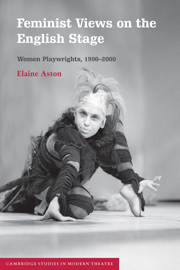Book contents
- Frontmatter
- Contents
- Acknowledgements
- 1 A feminist view on the 1990s
- 2 Telling feminist tales: Caryl Churchill
- 3 Saying no to Daddy: child sexual abuse, the ‘big hysteria’
- 4 Girl power, the new feminism?
- 5 Sarah Kane: the ‘bad girl of our stage’?
- 6 Performing identities
- 7 Feminist connections to a multicultural ‘scene’
- 8 Feminism past, and future? Timberlake Wertenbaker
- 9 Tales for the twenty-first century: final reflections
- Notes
- Bibliography
- Index
1 - A feminist view on the 1990s
Published online by Cambridge University Press: 22 September 2009
- Frontmatter
- Contents
- Acknowledgements
- 1 A feminist view on the 1990s
- 2 Telling feminist tales: Caryl Churchill
- 3 Saying no to Daddy: child sexual abuse, the ‘big hysteria’
- 4 Girl power, the new feminism?
- 5 Sarah Kane: the ‘bad girl of our stage’?
- 6 Performing identities
- 7 Feminist connections to a multicultural ‘scene’
- 8 Feminism past, and future? Timberlake Wertenbaker
- 9 Tales for the twenty-first century: final reflections
- Notes
- Bibliography
- Index
Summary
A dominant view of the British stage as it entered the final decade of the twentieth century was that it was in a critical state; was on a downward spiral as it struggled to survive the draconian effects of the Thatcher years. In particular, paralleling the millennial moment of 100 years earlier, the 1990s, like the 1890s, were apparently suffering from a lack of ‘new drama’. The ‘most telling indicator of diminishing theatrical vitality’, writes Christopher Innes in conclusion to his epic study Modern British Drama 1890–1990, ‘is the comparative absence of new playwrights’. When Innes arrives at 1990, the final moment in a century of theatre that he traces back to Shaw in 1890, he presents a bleak picture of playwrights withdrawing from theatre (Harold Pinter), not developing (Howard Barker and Howard Brenton), retreating into commercialism (Peter Schaffer), or becoming part of an ‘old guard’ (David Hare, Tom Stoppard, Alan Ayckbourn).
However, in contrast to the downward trend in British drama as viewed through his list of male playwrights, Innes cites the emergence of women dramatists as a potentially energising force, given their political drive and desire to experiment. ‘Present tense – feminist theatre’ is how Innes titles his final chapter, set apart and signalling a new departure from the patterns and categories of playwriting through which he maps his century of drama. Innes was not alone in noting the energies of feminist theatre.
- Type
- Chapter
- Information
- Feminist Views on the English StageWomen Playwrights, 1990–2000, pp. 1 - 17Publisher: Cambridge University PressPrint publication year: 2003

